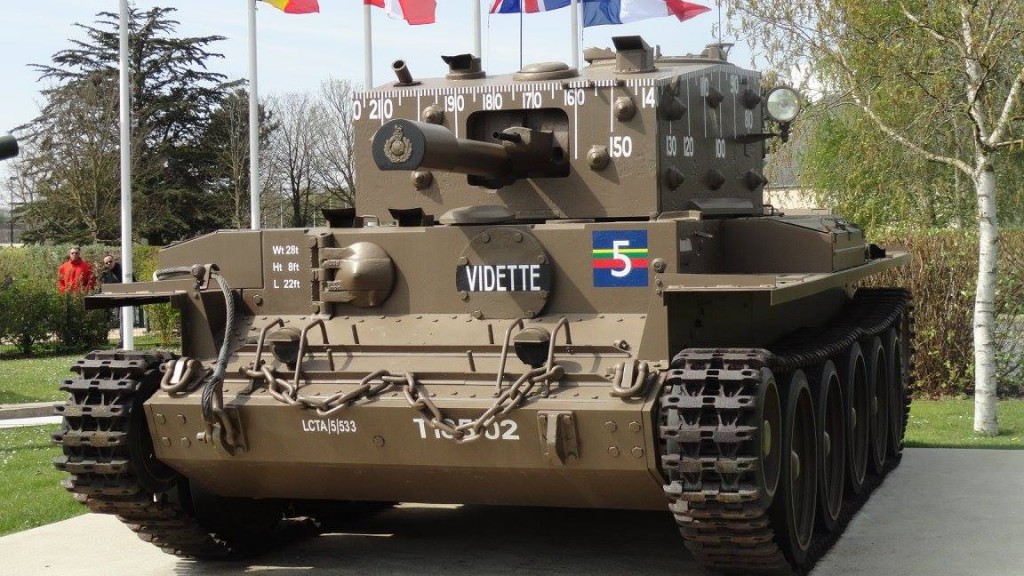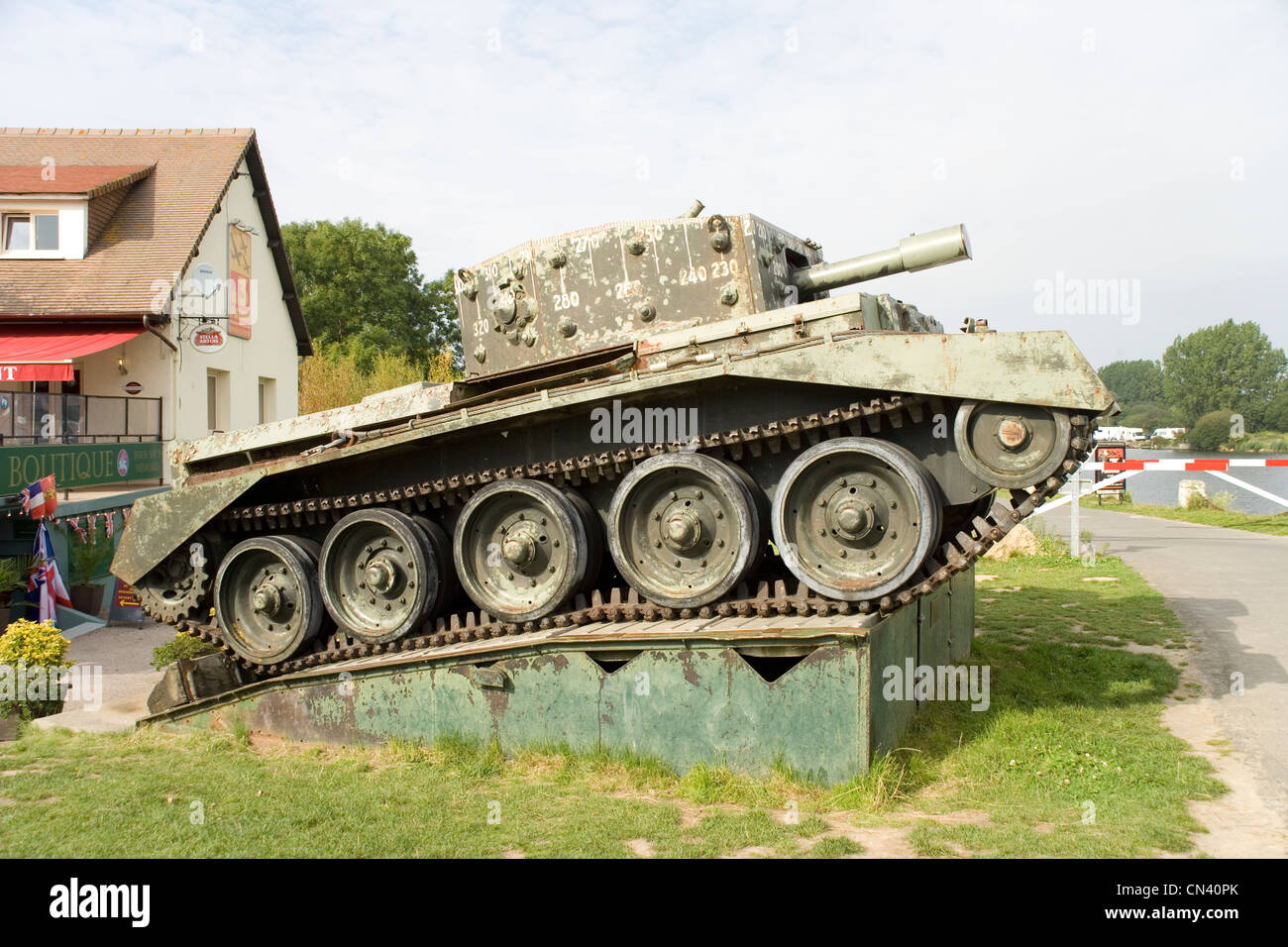
Centaur mk IV Vidette Normandie , musée de Pegasus Bridge Flickr
The British troops…. Britain's Cromwell tank first saw combat duty on the beaches of Normandy on D-Day, June 6, 1944. The British troops operating the tank fell in love in an instant. It was designed to be a high-speed tank that used a reliable Rolls-Royce engine. With a top speed of 40 miles per hour despite weighing 28 tons, the Cromwell.

Centaur Infantry Support Tank at Musée Pegasus Memorial DDay Tours of Normandy
After D-Day, the deployed Mk IV Centaur tanks take part in the Battle of Normandy but are gradually replaced by other models like Mk IV Churchill and Sherman tanks. Mk IV Centaur tank specification Creator/User: Britain Denomination: Mark IV Centaur tank Number produced: 80 Length: 6,35 m Width: 2,91 m Weight: 28,850 kg Maximum speed: 48 km/h

Centaur British Centaur tank in Normandy BearGrease Flickr
6th June 2016, 09:56 PDT By Stephen Dowling / Graphic by Nigel Hawtin Features correspondent Getty Images When allied forces landed on the Normandy beaches on D-Day, they did so alongside a fleet.

British Centaur Cromwell Tank by Pegasus bridge over the Orne Canal Normandy a relic from D Day
A part of that was recognising that sloped armour designs need to either be cast or welded, and since the British lacked the facilities to do tank casts, as well as the skilled workers to rely on welding, they opted for a riveted design since it wasn't as skill heavy. Every tank was designed in the way they were for good reasons at the time.

A Canadian Centaur Mk. IV tank on a street in a Norman town, France, 1944. [758x800] TankPorn
The Cromwell and Centaur tanks differed in the engine used; the Centaur had the 410 hp Liberty engine, the Cromwell had the significantly more powerful 600 hp Meteor; Centaur hulls were converted to Cromwells by changing the engine. The Cromwell first saw action in the Battle of Normandy in June 1944.

Tank Centaur MK.IV Tamiya 35232 Kit English
0:00 / 2:29 Centaur IV Dozer tank in Hermanville-Sur-Mer - Walkaround. Panzer Picture 64.6K subscribers Join Subscribe 23 Share 2.1K views 9 years ago HERMANVILLE-SUR-MER This was the spot of.

"Vidette", a British Centaur Tank immobilsed on Sword Beach on 6th June 1944, Pegasus Museum
While the Centaur equipped the Royal Marines during the Normandy battles, the Cromwell served until the end of the war and formed the basis for the Comet.In his fifth book in the TankCraft.

Centaur tank displayed at Pegasus Bridge in Normandy France. Armored vehicles, Armored
The Centaur tank MK IV was a derivative of the British Cromwell tank and were used to give fire support to the Commando forces landing on three of the five D-Day beaches, Gold, Juno and Sword. The initial plan was to use the tanks for the assault and for one week following the landings.

Normandy, 1944. Royal Marines Armored Support Group Centaur tanks. r/TankPorn
A WWII-era centaur tank has been refurbished in honor of the D-Day commemoration ceremonies to occur on June 6 th of 2014. The vehicle has not been used since the invasion, having been abandoned at Caen Canal for nearly seventy years.

Historic Centaur Tank Second World War Stock Photo 2209956381 Shutterstock
While the Centaur equipped the Royal Marines during the Normandy battles, the Cromwell served until the end of the war and formed the basis for the Comet. In his fifth book in the TankCraft series, author and illustrator Dennis Oliver uses official wartime photographs and comprehensively researched, exquisitely presented color profiles to tell.

Centaur IV Tank CategoryJuno Beach, 19440606 Wikimedia Commons Battle Of Normandy, D Day
The Centaur was designed to provide close support to the Royal Marines landing on the French coast of Normandy on D-Day 6th June 1944. The gun was intended to be fired from the landing craft at enemy fortifications on the beach. In the background you can see the original Pegasus Bridge

Centaur tank Mk IV Pegasus Bridge Memorial Militair, Militaire wapens
A27L Cruiser Mk.VIII Centaur United Kingdom (1943) Cruiser tank - 950 built The British Leyland cruiser The Centaur and the Cromwell are narrowly related. In fact, both are derived from the Centaur I, the A24 cruiser Mark VII. In 1942, the A27L was named "Cromwell II" and, afterwards, Centaur.

World War 2 in photos — Centaur Mk. IV Canadian tank in a French town in...
The Centaur Mk IV tanks were built in relatively limited numbers and only 80 were allocated for close support of British and Canadian infantry on D-Day. Assorted Centaur hull components of various Marks, heavily modified in the 1970s, survive at the Cobbaton Combat Collection, Devon, while the only known complete Mk IV tank is on static display.

Mk IV Centaur tank, Café Gondreé, Pegasus bridge, Normandy Cromwell tank, Centaur, Wwii photos
The most renowned British Cruiser tank. The Cromwell is arguably the best known, most produced and most successful of the cruisers lineage started in 1936, at least until the arrival of the Comet in late 1944. Its genesis goes back to 1941, and the choice of the gun and engine proved to be crucial matters. War priorities spawned three tanks.

Centaur Mk IV tank, Normandy WW2 A Military Photos & Video Website
Specification The A27L Cruiser MK VIII Centaur IV CS (Close Support) tank to give it its full name was the Royal Marine Armoured Support Group version of the Centaur tank. It was armed with a 95 mm howitzer that fired high explosive HE shells. Officially 51 HE rounds could be stored inside the tank.

1944, France, Normandie, Un char canadien "Centaur Mk IV." dans les rues d'une ville Tank
This is the Centaur tank that is right next to Pegasus Bridge in Normandy.